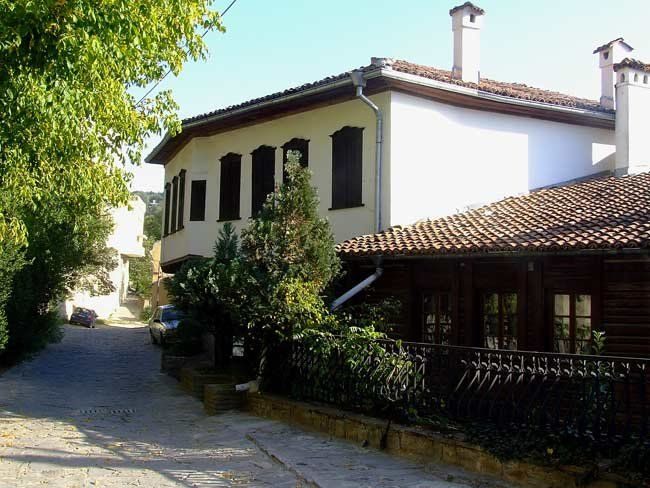

Sarafkata house dates back to 1861.
The original idea was that it would be a beautiful building to serve as a residence and place of work, but before being completed, its owner, trader Dimo Sarafina, died, and it was inherited by his wife Anastasia Sarafkata. So the landlady name became the name of the house and also became popular with the locals as Sarafkata’s house. In 1965 it was declared a cultural monument of national importance. Over the years, Sarafkata’s house was the home of the bishop, amusement hall and inn, and today is a monument of culture. In 1981 it was transmitted to the Regional Museum of History in Veliko Tirnovo and it has been restored.
The land on which it was built, offerred an architectural predestined solution. South side, facing the Yantra River is of five levels and, on north side – from “Gurko” street – with two levels. The entrance from the “Gurko” street is closed with a wooden door. It leads into the entrance hall. On the eastern side begins the staircase leading to the three floors below. There are service facilities, warehouses and cellars. To the south, the first floor ends with a large terrace, opened across the river.
Representative rooms are located on two upper floors. On fourth floor it is arranged a spatious hall around which four rooms and several smaller ancillary rooms are grouped. The top level is connected to the lobby by a spiral staircase. It starts with a decorative foldable door and a wrought iron railing. Such a handrail passes between the wooden columns of cylindrical shape and the floor looks like a gallery. Thus, it is achieved an large interior space and a highly impressive look. The atmosphere of tranquility and comfort is enhanced by the hall windows model, in the hall, by the columns and by the magnificent sculpted ceiling.
Currently, the fourth and fifth floors of the house host a temporary exhibition. This reflects the main events of the folk art of the late nineteenth – early twentieth century, in the region of Veliko Tirnovo.
In the first room are exposed impressive pottery collections (pitchers, bowls, jugs, plates, cups, ounce jugs with a hole in the middle, paving, trays) from Tirnovo region, dating back in XVIII – XIX centuries; house iconostasis and primitive icons; smith works (candlesticks, scissors, scales, padlocks); carved cabinets, chests, istaffs and kenaf; strips of wood for doors and cabinets; musical instruments; wonderful examples of stone carvings and reliefs.
In the second and third room there are handmade fabrics (linen, towels, rugs, huckabacks, tablecloths, belts, embroidered pillows and woven wares); male and female costumes characteristic for Tirnovo region – sukman coverage and sokay on the head; with two aprons; tipical male suit for the area, of black color. Beside these there are presented rich collection of gold and silver, made with different techniques.
In the fourth hall are shown ritual objects. The accent is put on a slice of ritual bread prepared and connected to various calendar and family celebrations. There is a rich collection of martenitsa, Sorcerer and Easter eggs. On top floor, by materials and photos, there is shown the history of photography in Veliko Tirnovo region.
